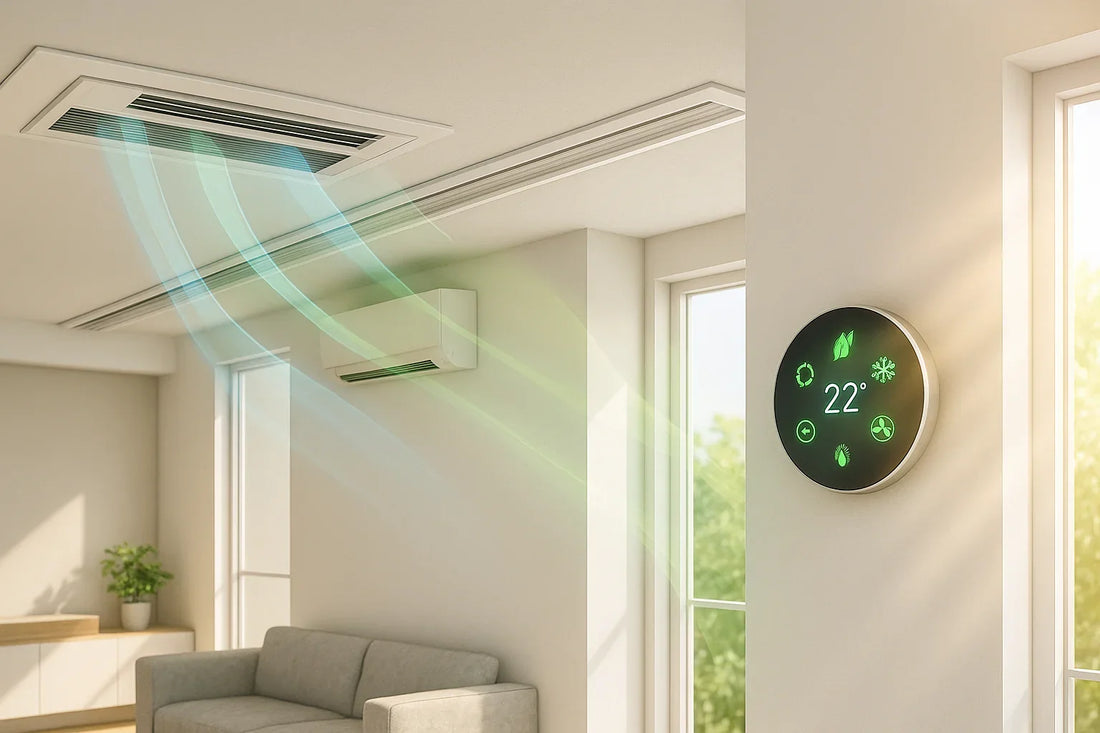
HVAC Energy Savings: Make Your HVAC System Energy-Efficient
Share
Eco-Friendly HVAC Solutions for Long-Term Energy Savings
In an era where energy conservation is more important than ever, making your HVAC system energy-efficient can significantly impact your energy bills and contribute to environmental sustainability. By understanding and implementing energy-saving practices, you can ensure that your air conditioning and heating systems operate at peak efficiency, providing maximum comfort while minimizing energy consumption.
Understanding HVAC Energy Efficiency
What is HVAC Energy Efficiency?
HVAC energy efficiency refers to the ability of heating, ventilation, and air conditioning systems to provide optimal indoor comfort with minimal energy use. Energy-efficient HVAC units are designed to require less energy to operate, thus reducing energy consumption and lowering energy costs. By optimizing the efficiency of your HVAC system, you can enjoy the benefits of reduced energy bills while maintaining a comfortable indoor environment.
Benefits of an Energy-Efficient HVAC System
Upgrading to an energy-efficient HVAC system offers several advantages, including significant cost savings. By replacing an older HVAC system with a high-efficiency model, homeowners can achieve energy savings of 10% to 30% on their energy bills. Additionally, integrating a smart thermostat can further enhance energy efficiency, allowing for precise control over heating and cooling, and enabling you to save energy effortlessly.
Key Terms in HVAC Energy Savings
Understanding key terms associated with HVAC energy savings is crucial for evaluating system performance. Below is a table representing some of these terms:
| Term | Description |
|---|---|
| Seasonal Energy Efficiency Ratio (SEER) | Measures the efficiency of air conditioners and heat pumps over a cooling season, with higher SEER ratings indicating better energy efficiency. |
| Annual Fuel Utilization Efficiency (AFUE) | Assesses a heater's efficiency in converting fuel to heat, contributing to overall HVAC energy savings. |
Additionally, the Energy Efficiency Ratio (EER) assesses HVAC efficiency at a specific outdoor temperature, while the Heating Season Performance Factor (HSPF) evaluates heat pump efficiency during the heating season.
How to Calculate HVAC Energy Savings
Using an Energy Savings Calculator
For those who embrace modern technology, an HVAC energy savings calculator can be a game-changer. Start by selecting the heating or cooling option relevant to your upgrade plans. Choose the appropriate details from the drop-down menus, such as the unit's location, current efficiency rating, and anticipated new efficiency rating. This tool swiftly calculates potential energy savings, enhancing your understanding of how a new HVAC unit can lower energy consumption and reduce your energy bill. With just a few clicks, you can evaluate the impact of upgrading to a more energy-efficient HVAC system, helping you make informed decisions that align with your energy-saving goals.
Factors Affecting HVAC Energy Efficiency
A variety of factors influence the energy efficiency of an HVAC system. The type of system plays a crucial role, as different systems have varying efficiency capabilities. The square footage of your home, the layout of your indoor spaces, and the quality of insulation significantly affect energy consumption. Additionally, local climate and daily weather patterns can impact how efficiently your heating and cooling system operates. The age of your HVAC equipment is another critical factor, as older systems typically consume more energy. By understanding these variables, you can make strategic choices to enhance your HVAC energy efficiency, ultimately achieving significant energy savings.
| Factors | Impact on Energy Efficiency |
|---|---|
| Type of System | Varying efficiency capabilities |
| Age of HVAC Equipment | Older systems typically consume more energy |
Calculating Savings on Your Energy Bill
To calculate potential savings on your energy bill, consider the AFUE rating of your heating system. High-efficiency gas furnaces, for instance, can offer a 10% to 20% reduction in energy costs compared to standard-efficiency furnaces with an 80% AFUE rating. Air-source heat pumps can also deliver substantial savings, often reducing heating and cooling expenses by 20% to 40%. By upgrading to high-efficiency HVAC systems, you can achieve lower energy bills and enjoy improved indoor comfort. Understanding these metrics allows homeowners to make informed decisions that align with their energy-saving objectives.
Choosing an Energy-Efficient HVAC System
Types of Energy-Efficient HVAC Systems
In 2023, the focus on energy-efficient HVAC systems highlights the advantages of heat pumps, high-efficiency furnaces, and advanced air conditioners. Heat pumps are particularly versatile, offering both heating in the winter and cooling in the summer, making them a popular choice for achieving year-round energy savings. High-efficiency HVAC systems are designed to reduce energy usage while maintaining optimal indoor comfort. By selecting the right system, you can significantly lower energy consumption and enjoy the benefits of an energy-efficient home.
Seasonal Energy Efficiency Ratio (SEER) Explained
The Seasonal Energy Efficiency Ratio (SEER) is a critical measure of an HVAC system's efficiency over a cooling season. A higher SEER rating indicates a more energy-efficient air conditioning system. Unlike tests conducted under controlled conditions, the SEER rating evaluates performance based on seasonal cooling conditions, providing a realistic assessment of energy efficiency.
| ENERGY STAR Specification | Benefits |
|---|---|
| Minimum SEER Rating Required | 14.5 |
| Advantages of Higher SEER Ratings | Significant energy savings and enhanced energy performance |
To meet ENERGY STAR specifications, a minimum SEER rating of 14.5 is required, ensuring that your HVAC unit operates efficiently throughout the cooling season. By choosing systems with higher SEER ratings, you can achieve significant energy savings and enhance the energy performance of your home.
Choosing the Right HVAC Unit for Your Home
Selecting the most suitable HVAC unit for your home involves considering various factors such as home size, layout, climate, and geography. Larger homes typically benefit from ducted HVAC systems to maintain consistent temperatures year-round. Heat pumps are an excellent option due to their dual functionality in both warm and cold weather. Additionally, opting for ENERGY STAR-certified systems ensures high-efficiency performance, reducing energy usage and increasing cost savings. By carefully evaluating these aspects, you can choose an energy-efficient HVAC system that meets your specific needs and enhances indoor air quality while optimizing energy consumption.
Improving Your Current HVAC System's Efficiency
Regular Maintenance and Air Filters
Maintaining your HVAC system is crucial for ensuring optimal energy savings and efficiency. Regular maintenance, including checking and replacing air filters, prevents dust and debris from clogging the system, which can hinder performance. An HVAC unit with a clean air filter operates more efficiently, reducing energy consumption and extending the lifespan of the system. Regular maintenance also ensures that the HVAC unit maintains its efficiency rating, allowing for consistent energy-efficient performance, which ultimately leads to lower energy costs.
Tips to Save Energy with Your HVAC System
To maximize energy savings, ensure your home is well-insulated to prevent air leaks that could undermine the efficiency of your HVAC system. Proper insulation works in tandem with energy-efficient HVAC units to maintain desired indoor temperatures with less energy usage. Utilizing programmable thermostats allows for precise control over heating and cooling settings, optimizing energy consumption. During hot summer months, keeping curtains closed can reduce heat gain, helping the air conditioning system work more efficiently. Ensuring your ductwork is sealed and in good condition also plays a crucial role in distributing air effectively, further enhancing HVAC energy efficiency and reducing energy bills.
Upgrading Components for Better Efficiency
For those with older or energy-intensive systems, upgrading components can significantly improve HVAC energy efficiency. Consider investing in high-efficiency units or modernizing ducting to enhance energy performance. If you're committed to staying in your home long-term, a new HVAC system with advanced technology and a higher SEER rating can deliver substantial energy savings. By keeping your HVAC equipment updated, you not only achieve lower energy consumption but also improve indoor air quality, ensuring a comfortable living environment while contributing to overall energy savings.
Impact of Energy-Efficient HVAC Systems on Energy Bills
Long-term Financial Benefits
Energy-efficient HVAC systems offer significant long-term financial benefits by reducing energy costs. These systems require less energy to heat and cool your home effectively, translating to lower energy bills over time. By investing in an energy-efficient HVAC unit, homeowners can enjoy consistent cost savings and a quicker return on investment, as the reduced energy consumption offsets the initial cost of upgrading to a more efficient system.
Environmental Impact of Energy Savings
Adopting energy-efficient HVAC systems contributes to a positive environmental impact by reducing emissions and conserving natural resources. Lower energy usage means fewer fossil fuels are burned, decreasing your carbon footprint and promoting sustainability. Utilizing less energy for heating and cooling aligns with environmental goals and the Department of Energy's initiatives to reduce energy consumption across residential sectors, fostering a healthier planet for future generations.
Case Studies on HVAC Energy Savings
Real-world examples illustrate the effectiveness of energy-efficient HVAC systems in achieving significant energy savings. Case studies often highlight how homeowners have successfully reduced energy bills and enhanced indoor comfort by upgrading to high-efficiency HVAC equipment. These examples serve as a testament to the practical benefits of investing in energy-efficient technology, showcasing measurable improvements in energy performance and reduced energy costs.
